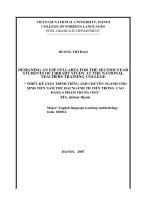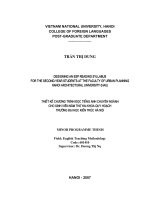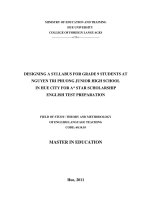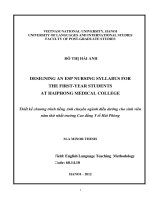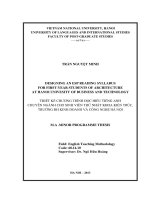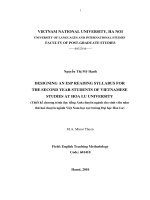Designing an ESP speaking syllabus for administrative police students at Intermediate level at People’s Police College
Bạn đang xem bản rút gọn của tài liệu. Xem và tải ngay bản đầy đủ của tài liệu tại đây (220.53 KB, 12 trang )
VIETNAM NATIONAL UNIVERSITY, HANOI
UNIVERSITY OF LANGUAGES AND INTERNATIONAL STUDIES
FACULTY OF POST-GRADUATE STUDIES
----------
NGUYỄN HOA HỒNG
DESIGNING AN ESP SPEAKING SYLLABUS
FOR ADMINISTRATIVE POLICE STUDENTS
AT INTERMEDIATE LEVEL
OF PEOPLE’S POLICE COLLEGE I
(Thiết kế chương trình nói tiếng Anh
chuyên ngành Cảnh sát Quản lý Hành chính
cho học viên hệ trung cấp trường Cao đẳng Cảnh sát nhân dân I)
M.A. MINOR PROGRAMME THESIS
Field: English Teaching Methodology
Code: 60140111
HANOI - 2016
VIETNAM NATIONAL UNIVERSITY, HANOI
UNIVERSITY OF LANGUAGES AND INTERNATIONAL STUDIES
FACULTY OF POST-GRADUATE STUDIES
----------
NGUYỄN HOA HỒNG
DESIGNING AN ESP SPEAKING SYLLABUS
FOR ADMINISTRATIVE POLICE STUDENTS
AT INTERMEDIATE LEVEL
OF PEOPLE’S POLICE COLLEGE I
(Thiết kế chương trình nói tiếng Anh
chuyên ngành Cảnh sát Quản lý Hành chính
cho học viên hệ trung cấp trường Cao đẳng Cảnh sát nhân dân I)
M.A. MINOR PROGRAMME THESIS
Field: English Teaching Methodology
Code: 60140111
Supervisor: Assoc. Prof. Dr. Lâm Quang Đông
HANOI - 2016
DECLARATION
I hereby certify that the M.A thesis entitled “Designing an ESP speaking
syllabus for administrative police students at Intermediate level of People’s Police
College I” is the result of my own research for the Degree of Master of Arts at the
University of Languages and International Studies, Vietnam National University,
and that this thesis has not been published or submitted for any degree at any other
universities or tertiary institutions.
Hanoi, 2016
Nguyễn Hoa Hồng
i
ACKNOWLEDGEMENTS
During the process of doing the research, I have received supports and
assistance from a variety of people.
First and foremost, I would like to express my profound gratitude to my
supervisor, Assoc. Prof. Dr. Lâm Quang Đông, for his insightful guidance,
constructive criticism and his whole-hearted encouragement without which the
thesis would not have been fulfilled.
I wish to express my special thanks to all my lecturers for their interesting
lectures, valuable comments and helpful suggestions. I am also grateful to all the
staff members of the Faculty of Post-Graduate Studies who gave me valuable and
essential instructions to fulfill my thesis.
I would like to convey my great thanks to my colleagues and administrative
police students at People’s Police College I for their invaluable feedback, useful
support and enthusiastic participation in this research.
Last but not least, I owe the completion of this study to my beloved family
who have given me their endless inspiration, support as well as sympathy
throughout my graduate program.
ii
ABSTRACT
This minor thesis was conducted with an attempt to design a suitable
supplementary material to teach ESP speaking skill for administrative police
students at Intermediate level of People’s Police College I (PPC I).
The thesis is organized in three main parts: Introduction, Development and
Conclusion. In the second part - the most predominant one of the study, two
research
instruments,
including
semi-structured
interviews
and
survey
questionnaires were presented in detail. Firstly, the subjects involved in the study
were 10 subject teachers and 10 administrative police officers. They were invited to
participate in the interviews conducted by the researcher. The second participants
of the study included 148 target students in three classes and all 16 teachers of
English at our college. Thanks to that, all of the participants contributed valuable
data to the author’s research about the target needs and learning needs of the
students in order to propose an appropriate syllabus for the students.
It can be concluded that most of the administrative police students at PPC I
really desire to be taught a speaking course for their major. Thus, it is crucial to
design an ESP syllabus which can satisfy with the students’ needs as well as their
job requirements after graduation. Additionally, the majority of the students
encounter certain difficulties in learning English speaking skill. Actually, they lack
background knowledge of vocabulary and pronunciation. Therefore, it is
imperative to have a supplementary speaking material with the aim to make up for
what they are now lacking. Besides, the target learners also express their
expectation in terms of the teaching and learning methods, speaking activities or
the time allocation of the ESP course. It is the useful data for the researcher to
demand all types of needs of the learners, which helps enhance the learners’
inspiration in English lessons.
iii
Based on the findings, a proposed ESP speaking syllabus for administrative
police students is designed with the hope that it can bring many benefits for the
students as well as the teachers in the process of teaching and learning ESP
speaking at PPC I.
iv
v
PART A: INTRODUCTION
1. Rationale for the study
Nowadays, it cannot be denied that English has become one of the most
popular languages all around the world. As an international language, English plays a
crucial role in every aspect of social life from economy, education, culture, health care
to diplomacy, science, technology and security, etc. Thus, there has been an explosion
in the demand for English. That is also the reason why English teaching and learning
is paid special attention by every nation and Vietnam cannot also stand out of the
current trend. There have been an increasing number of people studying English
everyday and longing to master the language for different purposes, but most, if not
all, language learners want to develop proficiency in speaking. As Richards (2008:19)
asserted, of four major language skills, the mastery of speaking skill in English is a
priority for many second language or foreign language learners. Therefore, the
proficiency in English speaking skill should be the learners’ first and foremost
concern.
To improve learners’ English speaking ability, a variety of textbooks and materials
have been published. At People’s Police College I (PPC I), the textbook “Lifelines
Pre-Intermediate” is being used as the core textbook to serve this purpose. However,
most of the students, especially the students at Intermediate level, who account for the
majority at our college, always meet difficulties in English speaking as well as oral
presentation. They always feel anxious, inconfident or uninspired in the speaking
lessons. There are a lot of reasons for this situation, e.g. course syllabus, teaching
methodology, learning ability, learning motivation or facility, etc. As I see it,
inappropriate syllabus is one of the key elements leading to the unsuccessful speaking
performance since an inappropriate syllabus which is not strictly based on students’
specific learning needs cannot make them ready for their future jobs, and fails to
6
inspire students’ motivation as well as create effective English speaking lessons. Thus,
it is essential to design a supplementary speaking syllabus, which aims at narrowing
down the gap between the current textbook and the students’ specific and practical
needs.
Additionally, among all majors of our college, students of administrative police
programs account for the majority and may speak English a lot in their future job.
Therefore, it is imperative to design a supplementary material for these administrative
police students at Intermediate level. This requires a thorough study of their language
needs, which explains why I conduct the present study entitled “Designing an ESP
speaking syllabus for administrative police students at Intermediate level at People’s
Police College I.”
2. Aims and objectives of the study
The ultimate aim of this study was to design an ESP speaking syllabus for
administrative police students at Intermediate level of PPC I.
In order to achieve the above aim, the following objectives were identified:
Target needs: how administrative police students at Intermediate level of PPC I
are expected to be able to speak English by the end of this course so as to fulfill the
tasks of administrative police officers.
Learning needs: what they need to study during the learning process to make up
for their current deficiency so as to achieve the expected outcomes.
3. Research questions
In order to achieve the above aims, the study sought answers to the following research
questions:
What are the learning needs and the target needs of the learners in English
speaking to serve their future job as administrative policemen?
How should an ESP speaking syllabus be designed to cover the types of needs
identified?
7
REFERENCES
1.
Anthony, L. (1997). ESP: What does it mean? ON CUE.
Retrieved April 6, 2000
2.
Brown, H.D. (1994). Teaching by Principles: An Interactive Approach to
Language pedagogy. New Jersey: Prentice Hall Regents.
3.
Bygate, M. (1987). Speaking. Oxford: Oxford University Press.
4.
Doff, A. (1988). Teach English: Teacher's handbook. Cambridge: Cambridge
University Press.
5.
Dudley-Evans, T. (1998). Research Perspectives on English for Academic
Purposes. Cambridge: Cambridge University Press.
6.
Dudley-Evans, T. & St. John, M. J. (1998). Developments in English for specific
purposes: A multi - disciplinary approach. Cambridge: Cambridge University Press.
7.
Ellis, M. & Johnson, C. (1994). Teaching Business English. Oxford: Oxford
University Press.
8.
Graves, K. (2000). Designing language courses: A guide for teachers. Boston:
Heinle.
9.
Harmer, J. (1998). How to teach language: An introduction to the practice of
English Language Teaching. Addison Wesley Longman Limited (www.slideshare.net/
Maria-Fernanda/ how - teach – English –by-jeremy - harmer).
10.
Hutchinson, T., & Waters, A. (1987). English for specific purposes: A learning-
centred approach. Cambridge: Cambridge University Press.
11.
Hutchinson, T., & Waters, A. (1993). English for specific purposes. Cambridge:
Cambridge University Press.
12.
Iwai, T., Kondo, K., Limm, S. J. D., Ray, E. G., Shimizu, H. & Brown, J. D.
(1999). Japannese language needs analysis. Retrieved June 25, 2011, from http://
nfl.hawai- edu/ Networks/ . Edu/ networks/ NW13.
8
13.
John, T. F. (1991). From printout to handout: grammar and vocabulary
teaching in the context of data-driven learning. Birmingham: University of
Birmingham.
14.
Ladousse, G. P. (1987). Role- play. Oxford: Oxford University Press.
15.
Munby, J. (1978). Communicative syllabus design. Cambridge: Cambridge
University Press.
16.
Nunan, D. (1988). Syllabus design. Cambridge: Cambridge University Press.
17.
Nunan, D. (2003). Practical English language teaching. New York: Mcgraw-
Hill.
18.
Pieneman, M. (1985). Learn ability and syllabus construction. Clevedon, Avon:
Multilingual Matters.
19.
Prabhu, N.S. (1987). Second Language Pedagogy. Oxford: Oxford University
Press.
20.
Richard, J.C. (2008). Teaching listening and speaking. Cambridge: Cambridge
University Press.
21.
Roach, P. (2009). English Phonetics and Phonology. Cambridge: Cambridge
University Press.
22.
Robinson, P. (1991). ESP today: A Practitioner’s Guide. London: Prentice
23.
Schwab, J.J. (1978). Science, curriculum, and liberal education. Chicago:
University of Chicago Press.
9
I
